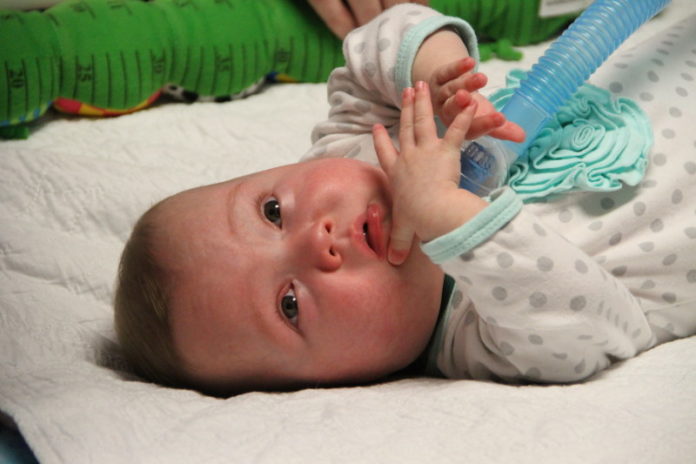
This month is Prematurity Awareness Month and today is World Prematurity Day. What many people may not know is part of the comprehensive care for the tiniest babies includes medications such as Sildenafil and caffeine. Nearly all of the babies in Nationwide Children’s Hospital’s neonatal intensive care units (NICUs) receive caffeine as they are coming off a ventilator and learning to breathe on their own.
“We were very surprised when they were using medications like caffeine especially when I wasn’t allowed to have a cup of coffee during pregnancy,” said Jennifer Tackett. Babies born prematurely like Jennifer’s baby, Autymn, born at 26-weeks at just 1.6 pounds, face many obstacles. Autymn came from Kentucky to Nationwide Children’s Hospital, which has one of the few Comprehensive Treatment and Research Centers for Bronchopulmonary Dysplasia (BPD) in the country, more than a year ago and is still in the hospital. “It’s something that you would not imagine being used for a baby, but it has truly helped her out tremendously.”
One of the complications of prematurity is that babies simply forget to breathe and simply do not remember that they are supposed to breathe all the time. Carefully giving neonates caffeine stimulates the brain, helping them to remember to breathe, and stimulates their diaphragm and lungs.
“The better their lungs works in the short term, the better their brain health will be in the future, preventing lifelong neurologic problems,” said Edward Shepherd, MD, section chief of Neonatology at Nationwide Children’s. “Consistently giving these little babies the equivalent of a cup of coffee can have remarkable results.”
Dr. Shepherd said that babies in the NICUs at Nationwide Children’s started to live longer when they were consistently given caffeine. The Small Baby Program is a standardized protocol for care, developed by the neonatology team at Nationwide Children’s and tested at the bedside, providing a uniform, interdisciplinary approach to the family-centered care of extremely premature babies. This includes making sure most small babies receive caffeine to ensure a hundred percent of potential patients get the medications that they need.
“If babies have lung problems, they are much more likely to have brain problems too. So anything we can do to make the lungs work better and anything we can do to make the lungs function better in the short term is likely to have lifelong impacts on how well these babies can think, how well they can walk, how well they can talk, and so forth,” said Dr. Shepherd, also a faculty member at The Ohio State University College of Medicine.
Another condition Autymn has is pulmonary hypertension, but a surprising drug has helped her lung condition improve. Sildenafil, better known as Viagra, is one of the many medications neonatologists have been able to adapt from the adult world, to help small babies like Autymn. About one to two percent of neonates at Nationwide Children’s receive Sildenafil for pulmonary hypertension, a condition that makes it too difficult for the babies’ hearts to pump blood through their lungs. In babies with BPD, pulmonary hypertension is the leading cause of death after their first month of life. Sildenafil has changed that; nearly eliminating death due to pulmonary hypertension in older babies in the Nationwide Children’s NICUs.
While Sildenafil is not FDA approved for use in newborns, it can be used in the intensive care setting. The drug, originally developed to treat hypertension in adults, works in pulmonary hypertension newborns by reducing pulmonary vascular resistance, relaxing the lungs and keeping the heart from having to work as hard. As some of the side effects are still not well known, this medication is reserved for the sickest babies.
“Caring for babies born prematurely is different than caring for adults or older children. We adapt what has been learned in adults and pediatrics for our very special, unique neonates,” said Dr. Shepherd. “These babies’ lives depend on medication that is reliable and can help lead them into a healthy childhood.”
Story Source:
The above story is based on materials provided by Nationwide Children’s Hospital. Note: Materials may be edited for content and length.
